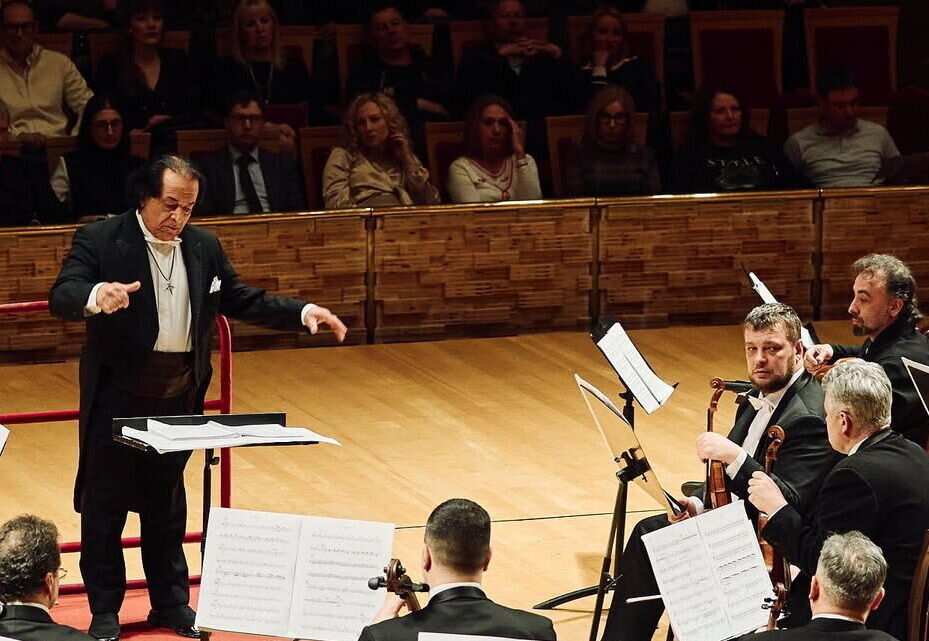Conductor Rahbari to perform “Persia, Concerto for Two Tars” again in Saint Petersburg

TEHRAN-Renowned Iranian composer and conductor Ali (Alexander) Rahbari will perform “Persia, Concerto for Two Tars” for a second time at the world-famous Mariinsky Opera and Concert Hall in Saint Petersburg, Russia, in June.
In the performance, composed and conducted by Rahbari, Iranian tar soloists Aidin Olyanassab and Mahsa Kharatian will accompany the Mariinsky Orchestra.
They will perform symphonic poem No. 8 from “My Mother Persia” album composed by Rahbari, on June 19, IRNA reported.
“Persia, Concerto for Two Tars” was first staged on March 21 at the same venue and was warmly welcomed by the audience.
Rahbari’s “My Mother Persia” is a cycle of symphonic poems suffused with the rich melodies, rhythms and improvisations of Persian traditional music in which he is profoundly versed both as composer and conductor.
In July 2022, Rahbari made his debut at the Mariinsky Theater and since then, he has been a regular on the Mariinsky stage.
Aidin Olyanassab, 49, began his musical journey at age 9 by taking up the tar. He received his foundational training under esteemed mentors such as Jamal Samavati, Zeydollah Tolu’i, Arshad Tahmasbi, Hossein Alizadeh, and Dariush Talai, mastering both the preliminary and advanced traditional repertoire.
In 1999, following the release of his tar technique album “Dar Gozar…” (In Passing…), he expanded his musical expertise by studying classical piano at the Tehran Conservatory of Music with Katrin Arefy, Tengiz Shavlokhashvili, and Haynoush Makarian. His musical education continued under the guidance of Sophia Mikayelyan and Sergey Sarajian at the Komitas State Conservatory of Yerevan.
After returning to Iran, Olyanassab contributed to music education at the Art University of Tehran and the University of Guilan, teaching specialized courses in tar, piano, orchestration, and ensemble performance. His creative output includes tar technique albums – “Dar Gozar…” (1999), “Sargashteh” (Confused) (2013), and “Rad-e Pa” (Footprint) (2018) as well as a collection of vocal and orchestral works.
Since 2014, he has led the Uranus group, performing his works in Iran and internationally, and in 2019 he founded Uranus Specialized Music Academy, furthering his commitment to the development and dissemination of traditional Persian music.
Mahsa Kharatian, 24, is an accomplished tar player who bridges the rich heritage of Persian classical music and contemporary innovation. A graduate of the Tehran Conservatory of Music, she is currently furthering her studies at the Iran University of Art in Tehran.
Under the mentorship of Aidin Olyanassab and Hamid Khabbazi and inspired by maestro Rahbari, she has developed a distinctive and expressive approach to the tar.
Rahbari, 76, embarked on his musical journey at the age of five, learning to play the violin. He graduated from the Vienna Academy of Music and Performing Arts in 1971, specializing in composition under the tutelage of Gottfried von Einem, and completed his conducting studies in 1974, guided by Hans Swarovsky. He is a laureate of international conducting competitions, securing the gold medal in Besançon, France (1977), and the silver medal in Geneva (1978).
He has conducted over 120 orchestras worldwide, including Orchestra della Svizzera Romanda, Tonhalle Orchestra Zurich, Rotterdam Philharmonic Orchestra, Orchestre National de France, French Chamber Orchestra, Gewandhaus Orchestra Leipzig, Stockholm Philharmonic Orchestra, and Prague Symphony Orchestra.
Rahbari has served as the principal guest conductor of the Czech Philharmonic Orchestra, receiving the Dvořák Medal in 1985 for his collaboration with the ensemble, and also led the Belgrade Philharmonic Symphony Orchestra, Belgian Radio and Television Orchestra (later becoming its principal conductor from 1988 to 1996).
He was the principal conductor of the Zagreb Philharmonic Orchestra and the Virtuosi di Praga chamber orchestra. From 2000 to 2004, he was the chief conductor and musical director of the Malaga Symphony Orchestra, Spain.
In 1997, Rahbari formed the Persian International Philharmonic Orchestra in Bregenz, Austria, by bringing together 60 Iranian musicians from Austria, Belgium, France, Germany, the Netherlands, Spain, Sweden, Switzerland, and the U.S. With this ensemble, he recorded Rimsky-Korsakov's “Scheherazade,” Khachaturian's “Violin Concerto,” and his own violin concerto, “Nohe Khan,” and was later awarded by the Vienna Academy of Music and Performing Arts.
He has released over 250 compact discs, with his recordings of operas by Verdi and Puccini under his direction gaining particular popularity.
SS/SAB
Leave a Comment